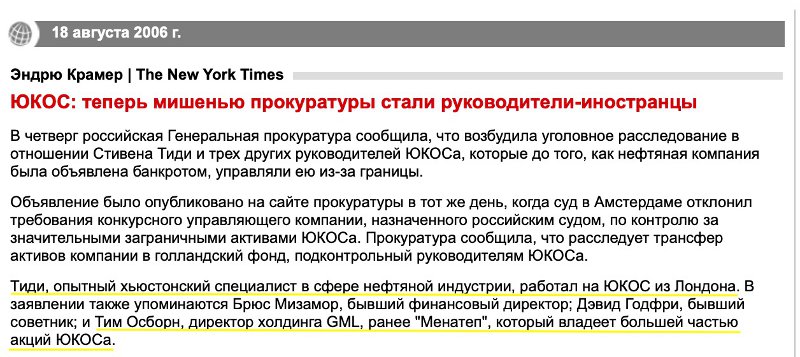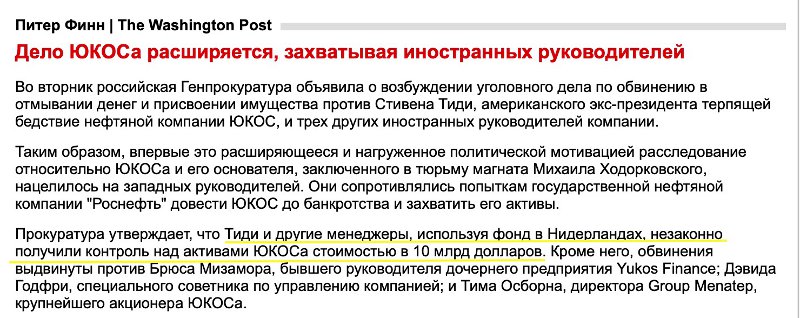
The newspapers “The New York Times”, “The Washington Post” and “The Financial Times” took alarm. The website Prigovor.ru reminds its readers of what happened on August 18, 2005, and on August 18, 2006. The Volgograd affiliate of Yukos has cooperated with straw men. “The New York Times”, “The Washington Post” and “The Financial Times” get excited. Little frolics of the Yukos affiliates
On this very day, on August 18, 2005, emerged yet another criminal case, which was filed by the Office of the Prosecutor of the Krasnoarmeysky District of the City Volgograd. According to the Office of the Prosecutor of the Krasnoarmeysky District of the City Volgograd, a criminal case was initiated in accordance with Article 199, paragraph 2 of the Criminal Code of the Russian Federation (Evading Payment of Taxes (or) Fees Collectible from Organizations on an especially large scale) with regard to the JSC "Service-M" (Volgograd). This firm is an affiliate of the Oil Company Yukos and it dealt with the wholesale of fuel and lubrication materials. Tax inspectors found out that the tax arrears of this firm during the period from 2002 to 2004 amounted to more than 6 million rubles.
As explained by Nikolay Chashchikhin, vice prosecutor of the Krasnoarmeysky district, during a preliminary review, it was established that the founder of this Yukos affiliate intentionally misrepresented accounting reports in order not to pay the income tax. It also became clear that “Service-M” cooperated with firms registered on straw men.
The Oil Company Yukos spawned several tens of such “affiliates” in all regions of Russia. In each concrete case, the amount of the tax arrears was different. Judging from the appearance, the sums were not big, sometimes not more than two or three million, but they summed up to huge amounts of tax arrears throughout the whole country. As to scheme of the “small frolics” of the Yukos affiliates, they more often than not were the same – room, table, chair, some place-holder for signing documents, and abnormal financial turn-overs which didn’t correspond to the real capacities of the affiliates belonging to the Khodorkovsky’s imperium.
“The foundation in Holland was nothing more than a scheme for enrichment of the four managers”
On this day, on August 18, 2006, the three leading world publications – The New York Times, The Washington Post, and The Financial Times – published articles about initiating criminal cases against American and British top managers of the company Yukos: namely, against ex-president of the Oil Company Yukos Steven Theede, financial director Bruce Mizamor, a special counselor on company management David Godfrey, as well as against the director of the company Group Menatep Ltd Timothy Osborne.
“The investigation believes that these people abused their offices and conspired to acquire the foreign assets of Yukos”, the prosecutor statement said”.
“Theede registered a special fund in the Netherlands in April 2005 and appointed Misamore, Godfrey and Osborne, and himself as directors of the fund. The plotters appropriated the shares of more than 20 affiliates of the corporation,” – so cited the newspaper The New York Times the statement of the Office of the Prosecutor General of Russia in an article entitled “Yukos managers are now targets of prosecutors”.

“These actions of the Russian Federation demonstrate with great clarity the vindictive nature and pettiness of those who lead Russia today”, the correspondent of the New York Times Andrew Kramer went on to say citing the upset by this turn of events Bruce Misamore who, goes without saying, denied any self-interested motive in the actions of the foreign management.
"The foundation, which was set up with the approval of the Dutch court, held Yukos assets that were beyond the reach of the Russian authorities. The foundation was designed to protect the interests of creditors, including Group Menatep.”
“In their statement, Russian prosecutors alleged that the foundation was little more than a scam designed to enrich the four executives, who appointed themselves foundation directors”, reports to the readers of “The Washington Post” its correspondent Peter Finn in an article under the title “Yukos probe widens to include westerners”.
 https://prigovor.ru/image/logos/all/18-2-wp.jpeghttps://prigovor.ru/image/logos/all/18-2-wp.jpeg
https://prigovor.ru/image/logos/all/18-2-wp.jpeghttps://prigovor.ru/image/logos/all/18-2-wp.jpeg
“A year ago (in 2005) a civilian court in Holland held that the benefits from the sale of these assets should be used to paying to foreign creditors of Yukos, including the group GML (This is an asset of Khodorkovsky, Nevzlin and others – remark of the editorial staff of the website Prigovor.ru). Thus, the foreign assets turned out to be beyond the reach of the liquidators dealing with the bankruptcy of Yukos.
But the Prosecutor General of Russia said that Theede and other former managers of Yukos, “using their official position, stole and then legalized assets entrusted to them and thus inflicting considerable damage to the owner – to the situated on Russian territory open joint-stock company “Oil Company Yukos”, pointed out the Moscow correspondent of the Financial Times Arkady Ostrovsky.

But, at the same time, the newspapers “The New York Times”, “The Washington Post”, and “The Financial Times”, that until 2003 named the Russian oligarch nothing less than “baron-robber”, this time with one voice defended the foreign managers of Yukos.
“It is unlikely that the men, all of whom live outside Russia, would be prosecuted in Russian courts or that they would be extradited to this country. Mr. Theede has not visited Russia since autumn 2003, when the company’s founder, Mikhail Khodorkovsky, was arrested on tax evasion and fraud charges”, - noted Andrew Kramer from “The New York Times”.
“Theede and the other managers had run the company from exile in London, and Russian prosecutors would have to seek their extradition. British courts have previously refused to honor Russian extradition requests for Russian executives of Yukos living in London, accepting the argument of their lawyers that the case against the company is politically tainted and they are unlikely to receive a fair trial in Moscow”, - points out Peter Finn from “The Washington Post”.
"Although this criminal case may not entail any real consequences – all defendants are foreign citizens living abroad – this is the first instance when Russian Office of the Prosecutor General brought charges against Western representative of the top management”, remarked Arkady Ostrovsky on the pages of The Financial Times.
Such practice of “unlikeliness”, and of ignoring by the Great Britain of Russian requests for legal support and extradition of fugitive criminals, should be corrected by the procedure of a trial in absentia which is a peculiar remedy against the impunity of all sorts of cunning dealers", points out the website Prigovor.ru.
(See also the previous story: On this very day, Pichugin received his first verdict. On the same day, the Office of the Prosecutor General took up the criminal case relating to the “oversee” top managers of Yukos – Theede, Misamore, Godfrey, and Osborne. The website Prigovor.ru reminds its readers of what happened on August 17, 2006).